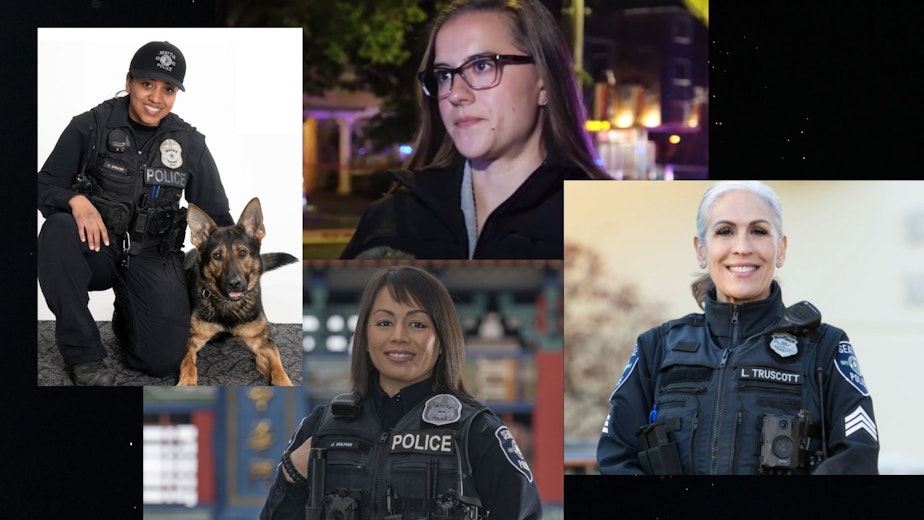Seattle cop accuses Chief Diaz of ‘predatory behavior’ and ‘grooming’

This story was updated to include a statement from Chief Adrian Diaz's personal attorney.
Four female Seattle police officers notified the city on Thursday that they intend to sue for sex discrimination, harassment, and hostile work environment.
The four women are Lt. Lauren Truscott, Officer Valerie Carson, Officer Kame Spencer, and Officer Judinna (Jean) Gulpan. They’re asking for $5 million in damages.
Allegations of harassment extend to the chief. “Chief [Adrian] Diaz seemingly engaged in predatory and discriminatory behavior,” wrote Sumeer Singla, attorney for the four women. Singla is a former assistant city attorney for Seattle, and provided counsel to the police department.
RELATED: 10 female cops speak out about sexism, harassment within the Seattle Police Department
Specifically, Diaz appeared to show interest in Officer Valerie Carson, Singla wrote, beckoning her for long chats at the end of her work shift in public affairs. “Chief Diaz’s practice became a running joke amongst his security detail, because they could not leave either.”
Diaz also commented on Carson’s dresses and high heels, according to the tort, and asked her to drive alone with him on New Year’s Eve 2020. Carson, uncomfortable, asked that his security detail be present.
“Ms. Carson thought it was odd that the SPD chief would want to go out alone with a female patrol officer on one of the busiest and hectic nights in the city without a security detail,” the tort reads. After some persistence, Diaz agreed to bring his detail, the tort says.
The chief also offered to do handy work at Carson’s house. She declined.
In a statement to KUOW, the Seattle Police Department Office of Public Affairs said it “does not litigate tort claims in the media.”
“For that reason, the department will not respond to the personal attacks rooted in rough estimations of hearsay reflecting, at their core, individual perceptions of victimhood that are unsupported and – in some instances – belied by the comprehensive investigations that will no doubt ultimately be of record,” the statement read.
They wrote that Diaz is proud of the advancements made by women at the department.
Ted Buck, Diaz’s personal attorney, in a statement to KUOW wrote that the claims against Diaz are false.
“As a Hispanic American with decades of experience in law enforcement, Chief Diaz has faced significant discrimination throughout his career. He well understands the negative impact it can have both personally and professionally,” Buck wrote.
He continued, stating that “a modern big city chief will always be the target of disgruntled, dissatisfied, claimants,” and that Diaz is “confident the revealing light of the judicial process will set the record straight on these allegations.”
RELATED: Seattle police lieutenant condemns Chief Diaz, says he enables department ‘serial harasser’
The tort also includes stories from Officers Kame Spencer and Jean Gulpan, who say they were sexually harassed by their supervisor, Sgt. John O’Neil. They have previously filed complaints against O’Neil, who heads the public affairs unit. O’Neil is one of Diaz’s trusted advisors.
The tort reads: “Sgt. John O’Neil began to make physical advances toward Ms. Spencer. Sgt. O’Neil would put his arms around her and touch her in a way that made her feel physically uncomfortable.”
Spencer works on the K9 team as a dog handler.
Gulpan said that O’Neil invited her to Vegas with colleagues, but she found herself alone with her supervisor in his hotel room when he indicated others would be present. At dinner, O’Neil told her, “I’m really good at sex,” according to the tort.
When Gulpan complained directly to Chief Diaz, Diaz said there had been a miscommunication between the two cops. Diaz told her, according to the tort, that if she wanted to rise in the ranks, “there are certain buttons to avoid touching.”
Also named as a possible defendant is Rebecca McKechnie, who works in human resources at the Seattle Police Department. According to the tort, McKechnie blamed the women when they complained.
“You just got mad because you don’t like being told what to do,” McKechnie said to Officer Spencer, according to the tort.
To Officer Gulpan, McKechnie allegedly said she should act “like a puppy” around John O’Neil to anticipate his needs “so she could be fed by him.” McKechnie also told Gulpan to smile more often and to stop “oversharing” when asked how she’s doing.
“They don’t actually care, it’s just a formality,” McKechnie said, according to the tort.
These allegations should not come as a surprise to anyone paying attention to the Seattle Police Department. The department commissioned a report in which female officers painted an atmosphere rife with sexism, harassment, and ruled by a “good old boys club.”
Lt. Lauren Truscott has been vocal recently, filing a separate complaint in March, alleging that O’Neil had harassed women, and that the chief had enabled him.
“This behavior has been allowed to continue for years and speaks to the toxic environment and endless challenges for women in the Seattle Police Department,” Truscott wrote in her complaint.
This lawsuit would be the third filed during Adrian Diaz’s three-and-a-half years as chief that alleges widespread sexism in the police department.
In an interview with KUOW, Singla, the attorney said, “Mayor Bruce Harrell and the City Council need to answer the question: Do you support the women who say they’re being abused or do you support the chief who is allowing the abuse to happen.”


